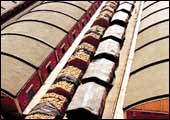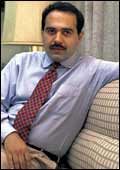 |
| Truckloads of wheat: Another scam? |
The
sheer physical impossibility of it all is striking: it would have
taken a million truckloads to transport the five million tonnes
of wheat that have strangely gone missing from Food Corporation
of India's godown and channel in Punjab. Food Minister Sharad Yadav
has expectedly ordered a probe and a report by the end of March.
Ministry officials attribute the problem to an accounting error
but that hasn't stopped Yadav from asking FCI's Senior Regional
Manager (In Charge), V.K. Singh, to go on leave pending the investigation
that will look at issues such as bulk sales and movement of wheat
from the FCI godown to ports. It is unlikely the Rs 3,200 crore
worth of grain will ever be found, provided it existed in the first
place. The FCI's books have already been corrected to reflect the
missing five million. It isn't another Enron, but this sure is a
large accounting error.
-Ashish Gupta
DUMP
Busman's Grouse
Makers of commercial vehicles believe
a 5 per cent reduction in tariffs could open the door to cheap imports
of used trucks.
 |
| Dumping Dread: For now, all these trucks
are Indian |
Not
everyone is happy with Jaswant Singh's first budget. The makers
of commercial vehicles believe his decision to prune import tariff
on second-hand commercial vehicles from 30 per cent to 25 per cent
could result in a surge of such imports from developed nations.
One might think a 5 per cent cut can't be all that threatening but
as R. Seshasayee, President, Society of Indian Automobile Manufacturers,
and Managing Director, Ashok Leyland, puts it, ''you never know
at what level (of tariff) used vehicles will start being dumped
into the country.'' Manufacturers fear that this could hurt the
industry's fortunes that have been on the ascendant in 2002-03 and
point to the high import tariff on used cars (105 per cent) as justification
enough for a rollback. For the record, China doesn't figure in the
list of countries that could dump their used vehicles in India-Chinese
trucks cost a lot and their emission levels are way too high.
-Swati Prasad
Q&A
''India Should Market Itself''
 |
| Arshad Zakaria: It's a difficult market |
He is one of the most powerful Indians on
Wall Street. Arshad
Zakaria, 40, Executive Vice President of Merrill Lynch
and President of the firm's Global Markets and Investment Banking
group was in India recently. Zakaria, who says he is ''more optimistic
about the Indian market than I have been in a long time'', met with
BT's Roshni Jayakar. Excerpts:
In terms of private equity flows, how do
you see the emerging markets?
It is difficult to predict flows on a short-term
basis. But if you look at the trends in the last few years, emerging
markets have been cyclical in terms of private equity flows. Going
ahead, you are unlikely to see the return of those high returns
in the US and the Europe. But countries like India are going to
become more attractive than they were in the period of 1999-2000,
when the US market was growing fast. Technology is an interesting
sector. Outsourcing and bpo are showing spectacular growth.
Any particular observations on India?
I spent a lot of time visiting Indian corporates
and my view is there is more buoyancy in corporates. Good companies
are showing topline growth. In India, technology and services-related
companies offer significant opportunities.
What should India do to take advantage of
the global opportunity?
Structurally, global investors are now going
to be looking all over the world for investment opportunities. It's
a period of opportunity for India to market itself-in terms of liberalisation
and infrastructure-and put its best foot forward.
GRAPEVINE
The End-Game Begins
IDBI's reverse merger into IDBI Bank
may finally happen.
 |
| IDBI Bank's Chadha: Mum's the word |
You won't find IDBI bank CEO Gunit Chadha,
a former Citibank fast-tracker, commenting on the reverse merger
of IDBI into IDBI Bank. That, he says, is up to the financial institution
that controls 57 per cent of the bank's equity, and the government.
What he will comment on is the rumour that he is quitting the bank.
''I am very much here,'' he says. ''My contract expires in August
2003.'' The man who has quit is Chairman M.S. Verma. An executive
at IDBI claims it was Verma who repeatedly scotched the reverse
merger. Now, with him gone, it looks like IDBI Chairman P.P. Vora
will become the bank's chairman and spearhead efforts towards the
union. Indeed, the merger is as good as done in the minds of IDBI
execs. Some of them are going through a training programme on banking
at the National Institute of Bank Management, Pune. And the Parliamentary
Standing Committee on Finance doesn't seem to have any objection
to the merger. Still, if the merger goes through it will take some
doing for the new IDBI Bank to become as efficient as the old-something
for which Chadha, who inherited a mess of a bank, can take credit.
He's silent on that front too.
-Roshni Jayakar and Shilpa Nayak
UPSTART
Fresh's The Word
RPG Retail has fresh plans for the market.
 |
| Food World: South of the border |
One would have expected
food world, RPG Enterprises' successful retail foray of seven years-there
are some 88 Food World outlets across 11 centres-to think of moving
to the northern and western markets. That, says RPG retail CEO Raghu
Pillai, will have to wait till 2005, by which time the chain would
have grown to 125 stores. Instead, the company plans to take its
hypermarket chain, Giant national (at a cost of Rs 175 crore over
the next five years), and launch Fresh World, a predominantly-perishable-produce
chain. The next few years will see the company putting down 50 such
stores, each at a cost of Rs 10-12 lakh. And yes, the effort will
be restricted to the south.
-Nitya Varadarajan
PROTECTION
Our Valuable Employees
Wipro, Infy, and HCL Tech take out sizable
insurance policies for their employees.
Group insurance isn't an alien concept
in India. For instance, Bangalore-based beer major UB has taken
life cover of Rs 16.5 crore for around 550 employees, an average
of Rs 3 lakh an employee.
That number is chump change when compared to
the Rs 876 crore for which Wipro has insured its 15,930 employees
with Tata AIG, the Rs 1,400 crore for which Infy has insured its
14,000 employees with LIC, and the Rs 975 crore for which HCL has
insured its 6,500 employees with National Insurance Company. That's
only apt for an industry that swears its fixed assets leave for
home every evening.
-Venkatesha Babu
|

